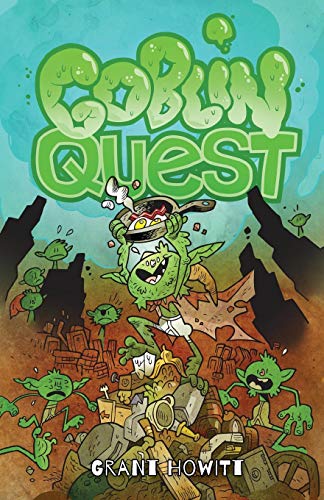I’m on a study project to improve my understanding of roleplaying games. To this end, I already have two reading projects, A Game Per Year and An Adventure Per Year. This is the third, with the goal of reading or playing 52 games made in the last few years. Originally I considered making this “A New RPG Per Week” and that’s where the number 52 comes from, even though a weekly schedule is probably not within my abilities.

Grant Howitt’s Goblin Quest is a roleplaying game about goblins who make ridiculous plans, die easily and engage in bizarre hi-jinks. It’s a quick game where you play through a session in a couple of hours, deciding on a quest and then trying to follow through in suitably ridiculous goblin fashion.
A key idea in Goblin Quest is that each player creates five goblins. When one dies, another shows up to replace them. This means that goblins can die in all kinds of funny ways as they try to fulfill their dream. (An example of a quest is to create a bear suit and use it to infiltrate bear society for the purpose of locating a pool of snot.)
The game has extremely simple mechanics where you decide what you want to do and roll a six-sided die. The level of resolution is not nearly as minute as in many other games so instead of going through each action separately you just roll for a broad plan. This is most definitely a “fail forward” style game so failures and catastrophes propel the action forward the same as successes do.
Kickstarter looms large over Goblin Quest. A lot of roleplaying games get funded through Kickstarter and sometimes it affects the content of the game as well. In the case of Goblin Quest, the Kickstarter features are as follows:
- A list of backers.
- A number of hacks using the basic Goblin Quest template for other kinds of games.
- Guest writers.
- More illustrations.
Some Kickstarter features stick out more than others. The extra illustrations meld in seamlessly. The variant hacks are very visible as they constitute half the book, as are the guest writers who contribute brief quest ideas. If you’ve read a lot of Kickstarter-backed games, you learn to recognize what’s core content and what’s included because of a crowdfunding promise.
The list of extra writers in Goblin Quest is as follows: Robin D. Laws, Merritt Kopas, Rob Heinsoo, James Wallis, Meguey Baker, Naomi Alderman, Frog Croakley, Kenneth Hite, Graham Walmsley and Matt Forbeck. An illustrious bunch.
The hacks are interesting from the perspective of learning about game design. They illustrate the different uses the core mechanism of Goblin Quest can be used for. If I ran a course on tabletop game design, I could imagine making an assignment of designing five variants based on a single system idea.
One of them, The Cthulhu Files, had an interesting idea where the table you use to determine dice roll results changes depending on how much you have suffered. You could express this idea simply as “if you’re healthy, a success is 4-6 but if you’re wounded, it’s 5 or 6”. However, the hack puts a bit more effort into it, giving the result tables more detail and nuance.
Once you’re teetering on the edge of oblivion, odds of success momentarily improve.